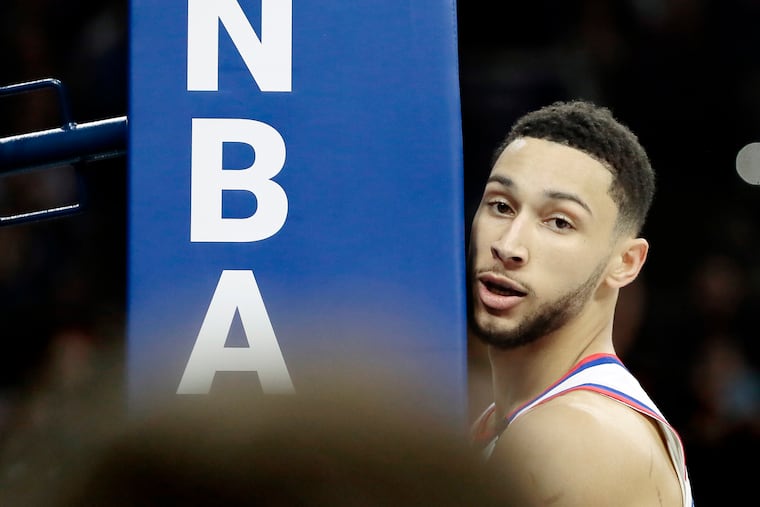Does the way Ben Simmons plays give the Sixers a shot? | Bob Ford
Without a perimeter game, the point guard is still great. But is he good enough?

The echo chamber that surrounds the local debate on Sixers point guard Ben Simmons has become so loud this season that even his most loyal defenders and most vociferous doubters have been rendered deaf to any talk of the middle ground where the truth always lies.
Stripped down to its core, the debate is simple: Does Simmons’ refusal to act as a perimeter threat doom the team to ultimate failure?
Other threads are woven through the issue — whether concerning his public demeanor, his body language, his dating choices, his teasing offseason practice videos, whatever. But the only thing that matters is whether an NBA point guard, regardless of his other gifts, can lead his team to a championship without a whisper of a jump shot to keep opposing defenses honest.
The answer is simple. We’ll find out.
There isn’t any other way to know, because it’s never been tried before.
Coach Brett Brown finds himself in the middle of this thing, and that’s somewhat of his own doing. He went on record in December asking Simmons to attempt at least one three-point field goal per game, and added that somewhere around eight free throws would be nice as well.
“You can pass this along to his agent, his family, and his friends, and to him. I want a three-point shot a game, minimum,” Brown said.
In the 23 games since, Simmons hasn’t tried a legitimate three-pointer. Not a single one. He had one desperation half-court heave, but that’s it.
A coach asked a player to do something and the player simply refused. You can dress it up any way you like, and perhaps a 23-year-old isn’t always aware of the consequences of his actions, but that’s a coach-killer right there.
“Evidently, I have failed,” Brown said, two weeks ago. “The attention that this has received is remarkable, but I guess I helped fuel it.”
Well, yes, and the reverberations in the echo chamber agree, but the real question has nothing to do with three-pointers. Maybe that makes the issue easier to define because there is a line on the court that everyone can see, and they can also see the player’s unwillingness to step behind it.
The question is simply about a jump shot, any jump shot. On that point, Brown remains adamant, and the history of the NBA is on his side.
“I think the drama of it is overblown. … Ultimately, it’s going to need to come into his game in a more pronounced way just from an attempt standpoint. That’s not overblown,” Brown said. “It’s completely, first, in his wheelhouse and, secondly, he will be liberated. His world will open up. And I think, in many ways, so will ours.”
The world is already pretty good both for Simmons and the Sixers right now. He’s averaging 16 points, 8 rebounds, and 8.5 assists, playing consistently outstanding defense, and finds shots for all his teammates on the court.
Just how good he can be was on display earlier this week in Brooklyn, when he scored 34 points, with 12 rebounds, 12 assists, 5 steals, and 2 blocked shots.
The flip side, however, in a Wednesday loss to Toronto, was a game in which Simmons took just seven shots in 38 minutes, and didn’t similarly impose his will against a top opponent when his team needed just that from him. The Raptors are a tough matchup for the Sixers, or anybody. Given the advantage of not having to guard Simmons outside the lane, Toronto is difficult to overcome.
What if he could just shoot 16-footers and shake the defense loose a bit? He wouldn’t have to even make a great percentage, only pose a threat.
It would be nice to find out, but that doesn’t seem likely. Not only isn’t Simmons progressing as a potential shooter, he’s actually regressing at an alarming rate.
In his first season, he took 79% of his attempts within 10 feet of the basket. Last season, it was 90%. This season, it is 93%.
Looking at that inviting mid-range game he could develop, Simmons made 32% of shots 10-16 feet from the basket as a rookie and 26% last season, and is making 13% this season.
So, to review, as the team has pleaded with Simmons to expand his range, as the player himself promised to come back from the offseason a more effective shooter, he is actually taking fewer jumpers and, perhaps as a result, making far fewer.
OK, so what?
Again, we will find out.
One side of the debate says his attributes outweigh his failings to such a degree that the lack of shooting doesn’t matter. It is a different recipe for success perhaps, but that is for the coach in the kitchen to sort out.
The other side says that playoff basketball against good teams able to ignore one of the opposing players is not the way to succeed. The idea that the Sixers are built for the playoffs because their roster is top-heavy and the team will be better with pared-down postseason rotations could be diametrically wrong. They could be more built for the regular season, but vulnerable when any playoff opponent has seven games to scheme them.
The games will answer the questions, as they always do. What is merely drama, what is overblown, what is just noise in the echo chamber, will be meaningless by the end.
Ben Simmons has not answered the questions himself. His play has simply posed them. That is going to change soon, however, and we’ll see who was right.